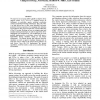Free Online Productivity Tools
i2Speak
i2Symbol
i2OCR
iTex2Img
iWeb2Print
iWeb2Shot
i2Type
iPdf2Split
iPdf2Merge
i2Bopomofo
i2Arabic
i2Style
i2Image
i2PDF
iLatex2Rtf
Sci2ools
102
click to vote
FLAIRS
2003
2003
Hybrid Intelligence for Driver Assistance
We report on our on-going effort to build an adaptive driver support system, Driver AdvocateTM , merging various AI techniques, in particular, agents, ontology, production systems and machine learning technologies. The goal of DA is to help drivers have a safer, more enjoyable, and more productive driving experience, by managing their attention and workload. This paper describes the overall architecture of the DA system, focusing on how we integrate agent and machine learning technologies to make it support the driver intelligently and unobtrusively. The architecture has been partially implemented in a prototype system built upon a high-fidelity driving simulator, letting us run human experiments. The human driving data collected from the simulator are used as input to machine learning tools to make DA learn to adapt to the unique driving behavior of each driver. Once the DA demonstrates the desired capabilities, it will be tested in a real car in an actual driving environment.
Artificial Intelligence | FLAIRS 2003 | Machine Learning | Machine Learning Technologies | Productive Driving Experience |
Related Content
| Added | 31 Oct 2010 |
| Updated | 31 Oct 2010 |
| Type | Conference |
| Year | 2003 |
| Where | FLAIRS |
| Authors | Chung Hee Hwang, Noel Massey, Bradford W. Miller, Kari Torkkola |
Comments (0)

